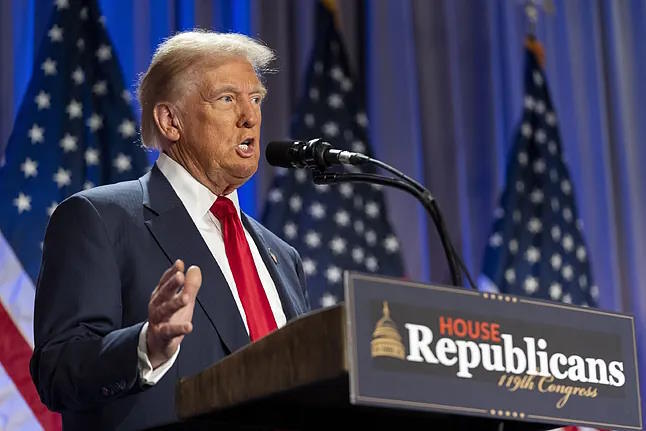On January 20, Donald Trump will be sworn in as the 47th president of the United States. Hours later, as he has promised, his first executive order will impose 25% tariffs on all products from Mexico and Canada and 10% on China. To the first two, until they close their border, his great obsession for a decade. To Beijing until it does something, like punishing drug traffickers with the death penalty, to reduce the arrival of fentanyl, one of the drugs responsible for the epidemic plaguing the country.
The threat has been constant for months, but this Monday the president-elect, who already has most of his economic team chosen, including the next Treasury Secretary and Commerce Secretary (if confirmed by the Senate), has provided more details on what he plans to do. "As everyone knows, thousands of people are crossing Mexico and Canada, bringing crime and drugs to levels never seen before. At this moment, a caravan coming from Mexico, made up of thousands of people, seems unstoppable in its intention to cross through our open border. On January 20, as one of my first executive orders, I will sign all necessary documents to impose on Mexico and Canada a 25% tariff on ALL products entering the United States and its ridiculous open borders," he wrote on Truth Social, the social network he owns. "This tariff will remain in effect until drugs, particularly fentanyl, and all illegal immigrants stop this invasion of our country! Both Mexico and Canada have the absolute right and power to easily solve this problem that has been lingering for a long time. We hereby demand that they use this power, and until they do, it is time for them to pay a very high price!" he added.
If confirmed (he made the same threat in his first term, but it did not materialize), the commercial threat would have devastating effects for its two neighbors, but also for the US economy, with an impact on prices, according to most economists. Mexico, China, and Canada are the top three trading partners of the United States and together accounted for over $830 billion in US exports in 2022. The 25% figure is very high, but during the campaign, he had promised much higher tariffs, up to 60% or more for Chinese products, 100% for all Mexican goods, and up to 200% for their cars.
Trump has never hidden his strategy, sometimes defined as "escalation through de-escalation." As his partners and followers say, using trade policy as a weapon to achieve economic and political results that benefit his country, thus fulfilling his America First policy. There is a very evident direct part, but also more subtle maneuvers. "This is an excellent way for Trump to make changes in foreign policy even before taking office," celebrated billionaire Bill Ackman. Many analysts believe it is also a way to give enough time, nearly two months, to the three countries to make some changes, or appear to, so that the president can also boast even before taking power of achieving 'diplomatic' successes.
That's what happened in 2019 when he threatened with 5% tariffs and an additional 5% each month until the border was closed. Shortly after, however, he settled the matter by stating that Mexico had agreed to take "strong measures." And that was it.
In a second message on the same social network, the president-elect also pointed to Beijing, blaming its government for doing nothing to stop the arrival of addictive drugs to the US. "I have had many conversations with China about the huge amounts of drugs, particularly fentanyl, being sent to the United States, but to no avail. Representatives of China told me they would institute their maximum penalty, death, for any drug trafficker caught doing this, but unfortunately, they never did," he said with disappointment.
"Drugs are coming into our country, mainly through Mexico, at levels never seen before. Until they stop, we will charge China an additional 10% tariff, in addition to any additional tariff, on all their numerous products entering the United States of America. Thank you for your attention to this matter," he said in a softer tone than towards his closest neighbors, with whom he signed the USMCA in 2020, an update of NAFTA, the free trade agreement in effect since the 90s. "It is the fairest, most balanced, and beneficial trade agreement we have ever signed. It is the best agreement we have made," he proudly said in January 2020.
The treaty has a review clause within two years, but the Republican team has been thinking about modifications for some time, for example, to make it difficult for China to use Mexico as an export base for its electric vehicles, steel, and other goods.
